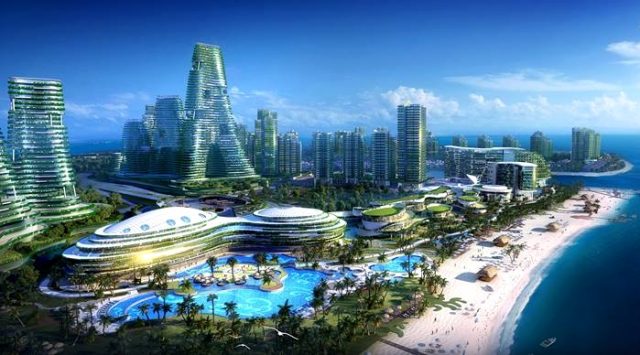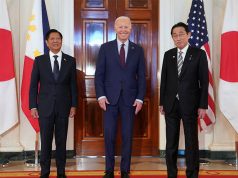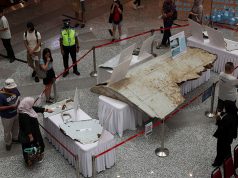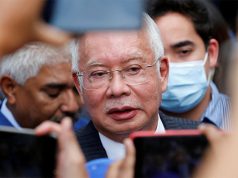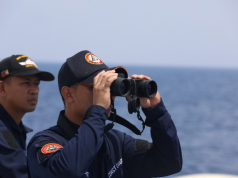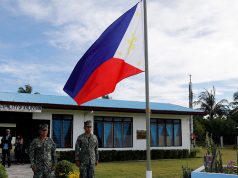For the Chinese developer Country Garden Pacificview, the city of the future would have residents from different parts of the world, plants covering the surfaces of buildings, and a multi-layer mobility system where pedestrians and cyclists own the main roads, and cars are relegated to underground.
And this is exactly what’s being accomplished in the company’s 20-year flagship project Forest City, located along the coast in the special economic zone of Iskandar in Malaysia. Neighboring Singapore is less than 30 minutes away by car.
The residential and commercial mixed-use development occupies 20 square kilometers of reclaimed islands and 10 square kilometers of the main island.
Southeast Asian journalists were invited to visit the township over the weekend, where they toured the Harbor Commercial Street, a retail area with duty-free shops, restaurants, and boutiques; stayed in Phoenix Hotel, a luxury accommodation with 283 guest rooms, restaurants, and meeting rooms; and looked at the first of six Industrialized Building System factories that would supply the prefabricated parts to be assembled on-site in Forest City homes.
Reporters also viewed the lavish, seaside Peony Littoral villas, with the biggest unit being a three and a half-storey house that occupies 6,500 square feet (approximately 600 square meters). Priced at 19 million Malaysian ringgit (about PhP224 million), it has six bedrooms, a bespoke elevator, a balcony, and a garden. Some 233 units will be completed by the end of 2018. All have been sold to buyers mostly from China, Singapore, Malaysia, Indonesia, South Korea, and Japan.
With a US$100 billion investment, the development of Forest City began two years ago. After an environmental impact assessment, the first phase of reclamation began in March 2015. It opened in March 2016.
It is sparsely populated for now, with only employees, construction workers, shopkeepers, security guards, and some tourists bustling about.
But Country Garden Pacificview president and chief strategy officer Dr. Runze Yu envisions that, by 2020, residents will have already moved in, and the community will be a much livelier one.
A duty-free shopping mall will have opened; all three golf courses – including one designed by golf legend Jack Nicklaus – will be up and running; and a landmark building will be ready for entrepreneurs to build their businesses in.
International school Shattuck-St. Mary’s will also be on its third year of operation by then.
“Everybody is talking about smart cities, but they don’t have a concrete (example),” says Yu, who leads regional strategy and business development for Forest City. “We studied every part of the world for smart cities. And the conclusion is, it’s always public sector-driven. We never saw a single successful case led by the private sector. So we want to be the first to try.”
Residents can look forward to living in a forest-like environment, with rooftop gardens, sky gardens, and coastal mangrove parks.
“They will be ready for the future climate change and sea level rise. Also, there’s a public space for the citizens in Forest City. So it’s very beautifully done,” Yu says. He also assures that the reclaimed area is “safe and geologically stable.”
As in the Phoenix Hotel, plants will cover the buildings’ surfaces to purify the air, lower indoor temperature, and reduce outdoor noise. There will be rainwater harvesting facilities, as well.
Houses will have smart electric and water meters, smart lighting and locks, automatic plant watering, an interconnected video intercom system, and a smart identification system along with the rest of the community for security.
As for its multi-layer mobility system, all roads, interchanges, and car parks will be underground. Pedestrians and bicycles will occupy the surface, and they will be only a few moments away from public transportation. There will be a light rail transit system, as well.
“The whole idea is to separate non-motorized transportation from the cars,” Yu says.
Forest City will be a prime model of “a green and smart futuristic city,” he adds.
The developer aims to attract eight industries: Tourism and MICE (Meetings, Incentives, Conferences, and Exhibitions); healthcare; education and training; regional headquarters; near-shore finance: e-commerce; emerging technology; and green and smart technology.
This year, Yu targets the tourism sector, in particular, given that Forest City’s duty-free center will be fully operational by November, and a jetty is being built in front of the hotel.
The “residential part” of the project is going smoothly, he says. “That’s why I need to produce more content for them. Even before actual homeowners are moving in, tourists should have something to do here.”
Yu hopes that young entrepreneurs will find a home in Forest City to build their businesses and enjoy cheaper living expenses compared to Singapore.
He also wants to lure nurses, doctors, hospital managers, and other professionals for a medical care hub and wellness center.
He disclosed that the project has sparked interest from at least one Philippine developer group, which paid a visit recently. Yu does not divulge the name, but has this to say: “They tried to get inspired, I would say, because this is a reclamation project. Not everywhere you can get the opportunity to reclaim.”
He adds that there are “follow-up discussions” with the group.
Yu says he and Country Garden chairman Yang Guoqiang met President Rodrigo Duterte during a lunch meeting with other companies in Hong Kong a few months ago, where the latter welcomed them and all other investors to the Philippines, where corruption “has been greatly reduced.”

